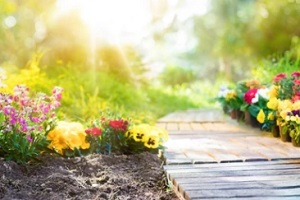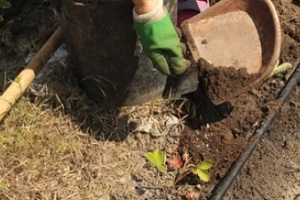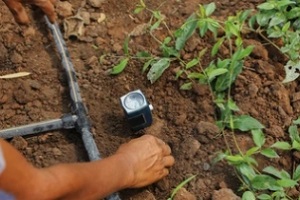 If you are looking forward to planting a garden this spring, it is never too early to start preparing. While your local garden center may not have the seeds or plants you would like to grow yet, you do need to start preparing your soil so that everything you plant once the warmer weather sets in will have optimum growth conditions.
If you are looking forward to planting a garden this spring, it is never too early to start preparing. While your local garden center may not have the seeds or plants you would like to grow yet, you do need to start preparing your soil so that everything you plant once the warmer weather sets in will have optimum growth conditions.
In fact, well-prepared soil is the foundation of a garden and has a greater influence on the ultimate success of your garden than the type of seeds you use. You are unlikely to end up with productive and healthy plants without giving them a proper soil base that allows the roots to reach the right depth to soak up the nutrients they need to thrive.
Here is a look at how you can prepare your soil for a spring garden.
Clear Out Weeds And Debris
Winter is a great time to remove weeds, mulch, debris and anything else that is preventing your garden from having bare soil. Any dead organic matter that you encounter can be placed in a compost pile so that it can start breaking down. While fresher mulch should be raked away to expose the soil beneath, you can leave well-composted mulch and organic matter right where it is so you can incorporate it into the soil.
When it comes to weeds, start with those that look like they may still be alive. Remove them from the soil and burn them, or place them toward the center of your working compost pile in a place where the heat can kill them before any of their seeds can germinate. Leaving living weeds around could wreak havoc on your garden once you get it underway, so be very meticulous in this process.
If you need to dig up any grass, use a shovel to cut the sod into small squares and then pry it from the area where you want to plant with the end of the shovel.
Loosen The Soil
Loosening your soil is essential because compacted soil will not allow your plants to grow. If your soil is heavily compacted due to heavy traffic in your yard, the roots will have a tendency to grow horizontally rather than vertically and will never reach the depth needed to properly absorb nutrients.
You should loosen your soil to a depth of at least 8 inches, but 12 inches is an ideal depth to allow your roots to reach downward properly.
Add Organic Matter
 Once spring starts to set in, it is time to add organic matter such as compost to the soil to give your plants the best start. You will want to do this on a day when your soil is moist yet not too wet.
Once spring starts to set in, it is time to add organic matter such as compost to the soil to give your plants the best start. You will want to do this on a day when your soil is moist yet not too wet.
Begin by spreading 2 to 3 inches of compost or aged manure across your soil. Try not to add more than 4 inches, however.
Whether you dig the organic matter into the soil or not is a topic of debate among gardeners. Some gardeners swear by doing this, while others believe that it’s best to leave the compost on the surface as it exposes fewer weed seeds and avoids disturbing the soil’s structure. After all, worms can do some of the digging for you.
Some experts suggest working in the compost if you have poor soil or it is the first year of your garden. Another good approach for soil that is hard and compact is building a raised bed or using planters and containers. An additional benefit of a raised garden bed is that it helps wet and cold soils to dry out and warm up faster.
Get A Soil Test
If it is your first time setting up a garden or past efforts in the same area have been unsuccessful, you may want to consider sending a sample of your soil for testing. This can tell you the type of soil you have, what nutrients are missing, and its current pH to point you in the right direction for improving your soil.
Kits for testing are available in garden stores and online, and you may find that your local university extension services offer soil testing. You only need to dig up a small amount of soil from a couple of places in your garden to get a better picture of what is happening in your soil.
Improve Your Soil
Depending on the condition of your soil, you may need to use soil amendments. Here’s a look at some of the most common ones and how they can improve your garden.
Compost
Decayed plant materials like scraps of vegetables condition soil and add nutrients while lowering its pH.
Aged Manure
This soil conditioner works well when it is incorporated ahead of planting, but it is important to avoid using fresh manure on a vegetable garden as it could introduce diseases and damage the plants.
Plant Material
Plant materials such as grass clippings, straw and leaves can be worked into your soil several months before planting so that they will decompose and add some structure and nutrients to the soil.
Lime
If your soil test finds that your soil is too acidic, you may use lime to bring it back to an acceptable level. However, you should only do this if a test recommends it.
Sulfur
 Sulfur can lower the pH of soil that is too alkaline, but like lime, it should only be added if a soil test recommends it.
Sulfur can lower the pH of soil that is too alkaline, but like lime, it should only be added if a soil test recommends it.
Whether you are going to plant directly into the ground or you are using raised beds, be sure you do not walk on the newly amended soil or it could become compacted. Keep your beds no wider than four feet so you won’t need to walk on the soil to access them.
Get In Touch With Dirt Connections
Reach out to the Northern Virginia soil experts at Dirt Connections online or over the phone at 703-828-0866 for help with your gardening project. We supply residential and commercial projects with a broad range of types of soil, and we can help you determine the best materials for your garden.
Summary

Dirt Connections was started with one goal in mind: providing quality residential and commercial construction services to clients on time and on budget. Reach out for more information on how we can support your next project.
For your convenience our estimates are free and by appointment. Call 703-940-9949 for a free estimate today!










































